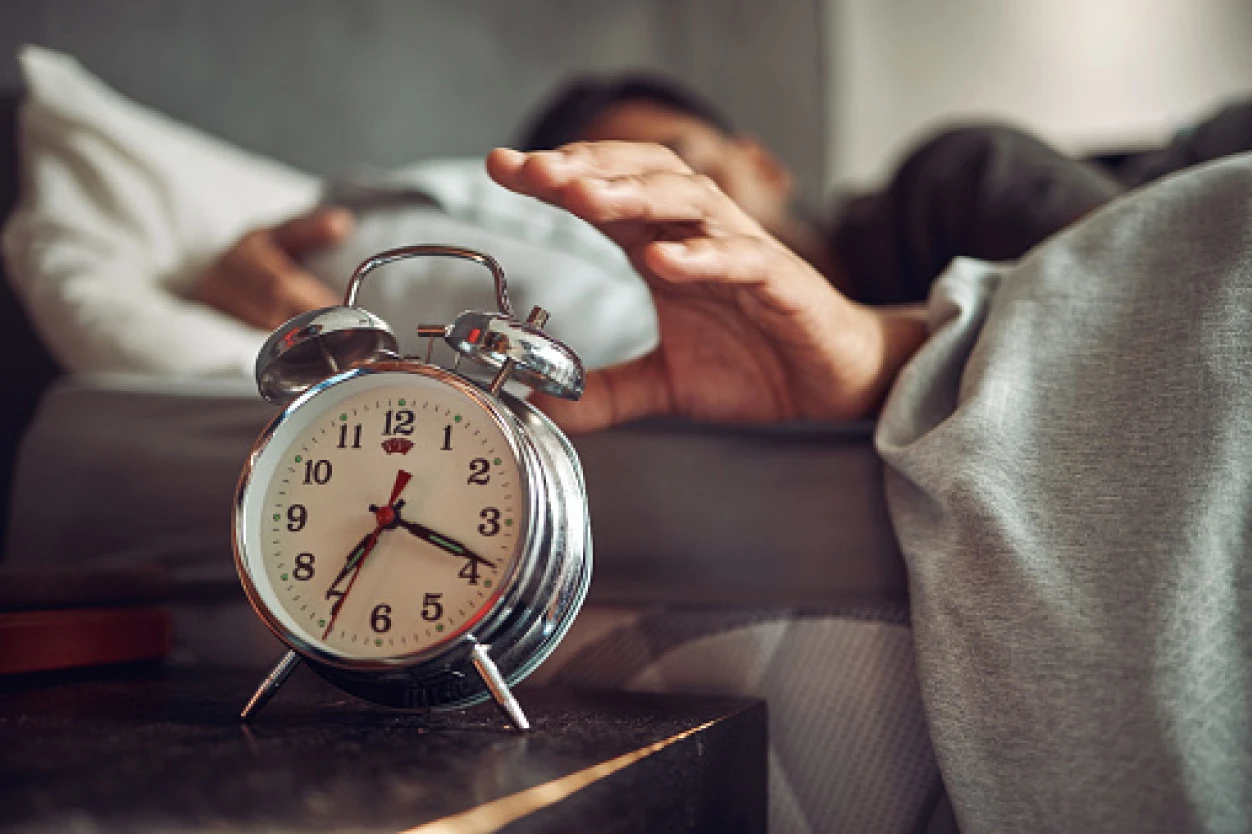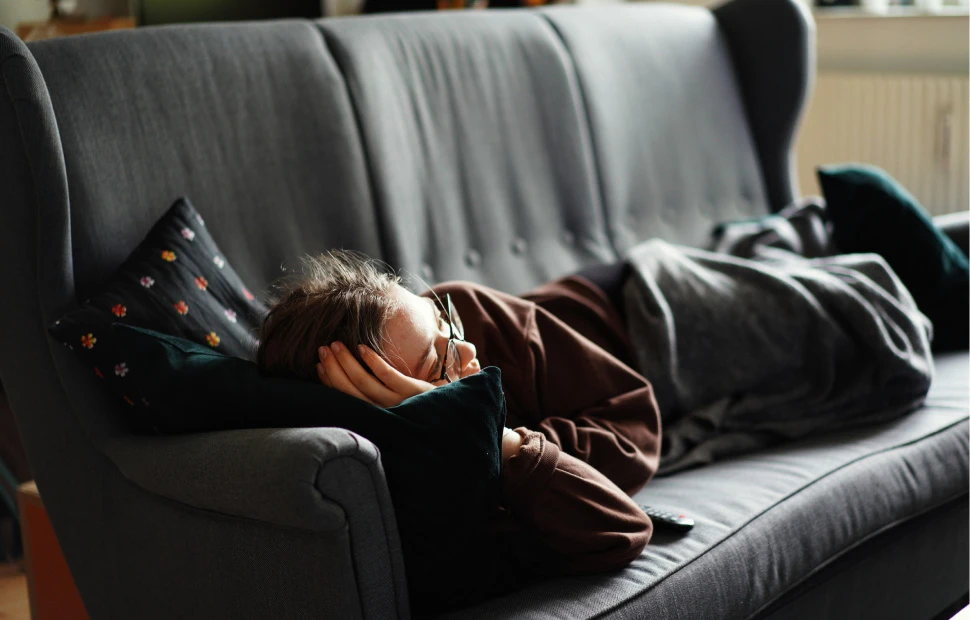Sleep
- Aoife Hickey, Senior Clinical Psychologist
- 10 minute read
- Last updated: July 2023

Sleep is vital for your physical and mental health. Sleep supports your:
-
emotional wellbeing
-
learning and memory
-
cardiovascular health
-
immune system
-
metabolism
Poor sleep is more common in stroke survivors than it is in the general population. Poor sleep after stroke is linked to slower recovery and to higher rates of depression, memory problems and falls.
Tips to improve sleep

Get into good sleeping habits
Some sleep problems can be tackled with good sleep habits, also called sleep hygiene. Sleep hygiene involves doing things that are known to aid sleep and avoiding things that get in the way of sleep. Here are some tips to help you get a better night’s rest:
1. Consider your sleep environment
Your bedroom should be quiet and tidy. It should be dark at night, not too hot or too cold. Your bed should be comfortable. Try to keep your bedroom just for sleeping and sex. Avoid watching TV, working or eating in bed. If bright street lights affect your sleep, use thick curtains or a wear an eye mask. Earplugs can help if noise is a problem.
2. Move more
Regular exercise can help you sleep, but avoid vigorous exercise in the hours leading up to your bedtime.
3. Avoid caffeine
Avoid drinks or food containing caffeine within four hours of bedtime. This includes coffee, tea, some soft drinks and chocolate. Caffeine is a stimulant and can keep you awake.
4. Avoid alcohol
Although alcohol can help you get to sleep, sleep tends to be of poorer quality and you are likely to wake up earlier.
5. Quit smoking
People who smoke tend to take longer to fall asleep, and have poorer quality and shorter sleep. Smoking also increases the risk of developing some sleep problems, including snoring and obstructive sleep apnoea.
6. Create a bedtime routine
In the hour or so before you intend to sleep, relax with a calm activity like taking a bath, reading or listening to music or the radio. Limit TV, phone or computer screens before bedtime. The light in these devices can make falling asleep and staying asleep more difficult. Avoid heavy meals close to bedtime.
7. Monitor napping
If you need to nap during the day, try to keep this to earlier in the day, and to a consistent time. Naps later in the day (after 3 o'clock) can make falling asleep at night more difficult.
Types of sleep problems
You may find that you have trouble sleeping after your stroke, or you might have had sleep difficulties before your stroke. Some sleep problems may settle with time and good sleep habits. Sleep problems include:
- difficulty getting to sleep
- difficulty staying asleep
- restless sleep
- unusual dreams/nightmares
- unrefreshing sleep
- excessive sleepiness during the day
Sleep disorders
Sometimes sleep problems can become chronic. Sleep problems which persist over time to the point that they affect your daily life are called sleep disorders. Some sleep disorders include:
This is the most common sleep disorder. It involves regularly having trouble sleeping over at least three months. It can include problems getting to sleep, staying asleep, or waking early in the morning and being unable to get back to sleep. It also involves problems during the day because of poor sleep, such as drowsiness, fatigue, tension, low mood, irritability, trouble concentration and memory problems. Not getting enough sleep can slow your recovery following stroke.
The most common sleep-related breathing disorder is obstructive sleep apnoea. Symptoms include your breathing stopping and starting during sleep, loud snoring, making choking or gasping sounds, having a headache when you wake up and feeling tired during the day. Symptoms may be noticed by a partner. Sleep apnoea increases the likelihood of further strokes, so it’s important to get treatment. Speak to your GP or stroke doctor, who will be able to refer you for assessment with a sleep specialist. If you’re diagnosed with obstructive sleep apnoea, treatment can include continuous positive airway pressure (CPAP). Lifestyle changes like stopping smoking, limiting alcohol and maintaining a healthy weight can also help. It’s important to avoid sedative medications.
This is a spontaneous need for sleep, to the point that you are unable to stay awake. You may doze or fall asleep at inappropriate times, such as while talking to someone or eating. You may regularly nap but still not feel refreshed, and sleep for longer than usual at night. This is more common shortly after stroke, but it may persist. It's linked to sleep-related breathing disorders, particular changes to blood flow in the brain, and depression.
Your sleep cycle usually follows a 24-hour cycle, which is called your circadian rhythm or body clock. Your circadian rhythm is disturbed when your sleep-wake cycle is no longer affected by sunlight and darkness. Sleeping times become random. It becomes difficult to sleep and wake at set times, meaning you might go to bed later (or earlier) and get up later (or earlier).
Other information
Getting help
If the tips above don’t help your sleep and your sleep problem is affecting your life, or you find you are regularly using over-the-counter medication to help you sleep, consider talking to your GP (family doctor)
Your GP (family doctor) may ask you about your sleep routine, alcohol and caffeine intake and general lifestyle. They will also assess whether any physical illness, mental health condition or medication may be contributing to your sleep problem.
If your GP (family doctor) thinks you have insomnia, they may refer you for cognitive behavioural therapy (CBT).
If your insomnia is severe, they may prescribe medication. If they think you have another sleep disorder, they may refer you to a sleep specialist for further tests.
CBT for insomnia aims to change unhelpful behaviours and thoughts which may contribute to your difficulty sleeping. It uses behavioural techniques to set healthy sleep patterns. It also addresses thinking styles linked with poor sleep. In addition to good sleep hygiene, CBT for insomnia includes:
- identifying and challenging unhelpful beliefs about sleep
- reducing attempts to control sleep
- creating a stronger association between the bedroom and sleep
- restricting time in bed with the goal of increasing your sleep drive
- relaxation techniques, such as progressive muscle relaxation, meditation, guided imagery or mindfulness
Your GP or stroke doctor will be able to check your medications to see whether they could be contributing to your sleep problems.
They may prescribe something to help you sleep. Prescription sleeping tablets are usually a last resort and should only be used for a few days or weeks at a time.
If your GP (family doctor) thinks you have a sleep disorder, such as obstructive sleep apnoea, they may refer you to a sleep specialist for further tests.
Sleeping tablets
Sleeping tablets (hypnotics) are medications that encourage sleep. Benzodiazepines and z-drugs can be prescribed for short periods to help with sleeping problems. These drugs are usually only prescribed if good sleep hygiene and CBT haven’t worked and if your insomnia is severe. They are not recommended for long-term use. This is because they can lose their effect over time and people can become dependent on them. They also have dangerous side effects, including daytime drowsiness, confusion, irritability, concentration and memory problems, and an increased risk of falls and accidents.
Melatonin
Melatonin is sometimes used to relieve insomnia. It contains a synthetic version of a hormone, melatonin, which helps regulate the sleep-wake cycle. It is usually recommended for three weeks at first, but it can be continued if it helps. Side effects can include headache, back or joint pain and cold-like symptoms.
Top tips
Sleep diary
"A sleep diary is a simple way of tracking key information about your sleep. A sleep diary can help you better understand your sleep pattern. It involves making a note of things like the time you went to bed, how long it took to fall asleep, the number of times you woke up during the night and when you woke up for the final time."
Aoife Hickey | Senior clinical psychologist |
Frequently asked questions
There’s no 'right' amount of sleep. Generally, a typical amount of sleep for an adult is around seven to nine hours, but this varies from person to person. Children typically sleep for longer than this, while older adults tend to sleep less. Type of sleep also varies with age. Older people tend to have lighter and more broken sleep compared to younger people, but it should still feel refreshing.
Sleep problems can happen for lots of different reasons.
Some individual factors make it more likely that someone will develop trouble sleeping. This includes a tendency to feel stressed or worried about sleep, general anxiety and depression symptoms, and a reduced pressure for sleep (the biological drive to sleep that gets stronger the longer we are awake and decreases during sleep).
Sleep problems are often triggered by things like a medical or psychiatric illness, stressful life events, certain prescription or non-prescription drugs, and shift work.
Sleep problems can be maintained over time by poor sleep hygiene, a tendency to stay in bed while awake and spending too long in bed. These are the kind of behaviours that are targeted in CBT for insomnia.
Stroke can exacerbate pre-stroke sleep difficulties or lead to the development of new ones.
Several brain structures are involved in sleep. These include the hypothalamus, brain stem (which includes the pons, medulla and midbrain), thalamus, basal forebrain, amygdala and pineal gland. Damage to these structures following stroke makes sleep problems more likely. This may be due to damage to the structure itself or because the brain chemicals and hormones involved in sleep have been disrupted.
Some effects of stroke can interfere with sleep. Pain, including headaches, might make it difficult to get to sleep. Fatigue is common after stroke, and people who are fatigued may nap more during the day. This can reduce the need for sleep at night. Some medications have side effects which disrupt sleep.
Hospitalisation can affect sleep. This is due to a combination of environmental factors, like noise and light, and medical or nursing care, such as early morning vital signs and blood tests.
A significant health event is often stressful and upsetting. Stress, anxiety and low mood can affect getting to sleep, staying asleep and sleep quality. In the initial stages after stroke, people may be preoccupied with things such as recovery, finances, changes in relationships and return to work, which can disrupt sleep.